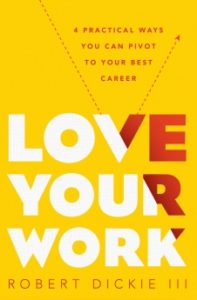Book Review: Love Your Work by Robert Dickie III

Are you struggling to find purpose in your work? Do you fear that technological and economic changes will make your job obsolete? Maybe you just want a career you love rather than a job that doesn’t provide fulfillment. Love Your Work: 4 Practical Ways You Can Pivot To Your Best Career by Robert Dickie III helps readers work toward a more satisfying and successful career path.
Pivoting
The book starts off by presenting some statistics about lack of job growth in recent years. It highlights the decline of many job sectors and the need for workers to learn new skills in order to stay relevant. Dickie talks about pivoting into a new career path at different stages of your career and life. Pivoting will be a recurring theme throughout the book, as it highlights various reasons one might pivot to a new career path and practical ways to do so.
The Four Quadrants
Reinvent is the first quadrant discussed in this section. It includes the example of Dreama Travis, a 59 year old woman who was laid off and went on to run an award-winning bed and breakfast. Revectoring occurs when you’re doing something you love but market or technological changes make it difficult for you to continue doing so successfully. Another inspiring example is provided of a distance runner who went on to start a company offering self-defense seminars in local running stores.
Repurposing occurs when there is opportunity but not passion. The example given here is of a young man who was offered a partner position in a prestigious law firm but who decided to pursue his passion and go to seminary instead. Finally, renewal emphasizes the need to always pursue growth and learning in one’s career. Several examples of professionals pursuing new knowledge and growth are highlighted for this final quadrant.
This chapter demonstrates the importance of one’s willingness to change and step outside of his or her comfort zone in order to achieve success. The examples offer additional inspiration for those who aren’t sure how to start.
Transcending Career Skills
This chapter discusses the importance of hard work, problem solving skills, emotional intelligence and other traits needed for career success. Possessing these traits is particularly important in the new economy because, as the book points out, differences in performance are magnified. These skills have been discussed by many career experts before, and Love Your Work goes into more detail about each one and how to go about acquiring them.
Growth and Opportunity
This chapter emphasizes the importance of avoiding bad industries and companies, while looking for growing fields. Then it details a variety of high-growth fields, such as green and renewable energy. As Dickie points out, what seems like a great opportunity might not be so good if it’s with a company in decline.
Leverage Failure and Small Steps to Success
Leveraging failure is an important concept for anyone seeking success to understand. As the book points out, something bad (like a layoff) can become something good in the long-run. In addition, you’ll learn what to avoid when trying to overcome setbacks. The final chapter, “The Long Gear: Small Steps to Success” discusses how to achieve success by analyzing what skills and experience you have, and resources for acquiring new skills.
Each chapter ends with Pivot Points – tips, advice and resources for accomplishing the goals mentioned. These chapter overviews are very helpful for reference after reading the book should you need reminders or quick inspiration.
One important note to potential readers: The book sometimes veers into religion (specifically Christianity) in relation to work and occasionally quotes the bible. This was not mentioned on the cover, in the title or in the description on the back.
Ultimately, Love Your Work has many important pieces of advice, inspiration and useful information for readers of all backgrounds. It is also timely, considering the rapid decline of many jobs and the new fields that are emerging to replace them. If you need some ideas on how to make a career change and are okay with the religious content, this is definitely a book worth checking out.
This book was sent to me for free. However, this is not a sponsored or paid post and all opinions are my own.


